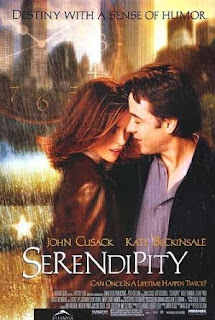Serendipity
 Getting back to Kate Beckinsale, she starred in Serendipity, a 2001 film directed by Peter Chesholm. I give credit to the filmmakers for choosing a word that most people probably can't define, but on the whole this movie was far too fluffy and mushy--it's for people who avoid conflict at all costs, even in their entertainment.
Getting back to Kate Beckinsale, she starred in Serendipity, a 2001 film directed by Peter Chesholm. I give credit to the filmmakers for choosing a word that most people probably can't define, but on the whole this movie was far too fluffy and mushy--it's for people who avoid conflict at all costs, even in their entertainment.Beckinsale and John Cusack, at his most twinkly, meet cute in Bloomingdale's vying for a pair of gloves. They are smitten but attached to others, but have sundaes together at the New York ice-cream emporium that shares a name with the film. Cusack goes heavy on the make, but Beckinsale is more demure, and tells him that if they are meant to be together, it will happen. She has him write his contact info on a five-dollar bill, and then spends it, and writes her info in a copy of Love in the Time of Cholera and tells him she will sell it to a used book store. If they find these items, well, it's kismet.
Of course any guy with a right mind would immediately size up a woman like this as a nut, no matter that she looks as good as Beckinsale. Therefore the script has a hard time convincing us that, as the years go by, these two are really meant for each other, even though they have only spent a few hours together. Both end up engaged to other people: Cusack to Bridget Moynihan, and Beckinsale to John Corbett. Moynihan's character is completely inoffensive, and I felt bad for her being the victim of chick-flickitis, but Corbett, who plays a Yanni-like musician, is set up as a preening twit.
It should be no shock to anyone that the five-dollar bill and the Marquez end up in the hands of our principals. It's interesting that both of these characters break it off with their duller fiancees off-screen, as if to try to eliminate all bad feelings.
Serendipity is a bit critic-proof--after all, it embraces it's coincidences and contrivances. But it could have been a bit less cliche-ridden: both characters have wacky best friends who aid them on their search for each other (Jeremy Piven and Molly Shannon). The only bit of originality is in the form of Eugene Levy as a pugnacious Bloomingdale's clerk (and I liked a cameo by Buck Henry).
I'm far too cynical for this type of movie. After Cusack and Beckinsale have dumped their intendeds (one right before what must have been a massively expensive wedding at the Waldorf-Astoria--no deposits returned on that one) they meet up at Wollman skating rink, and we fade to black. But I can only imagine that hours, perhaps minutes, later, we hear something like: "Oh my god, you smoke?" or, "Really, you voted for Bush?" or, in the great words of Paul Simon, "You like to sleep with the window open, I like to sleep with the window closed, so goodbye, goodbye, goodbye."


Comments
Post a Comment